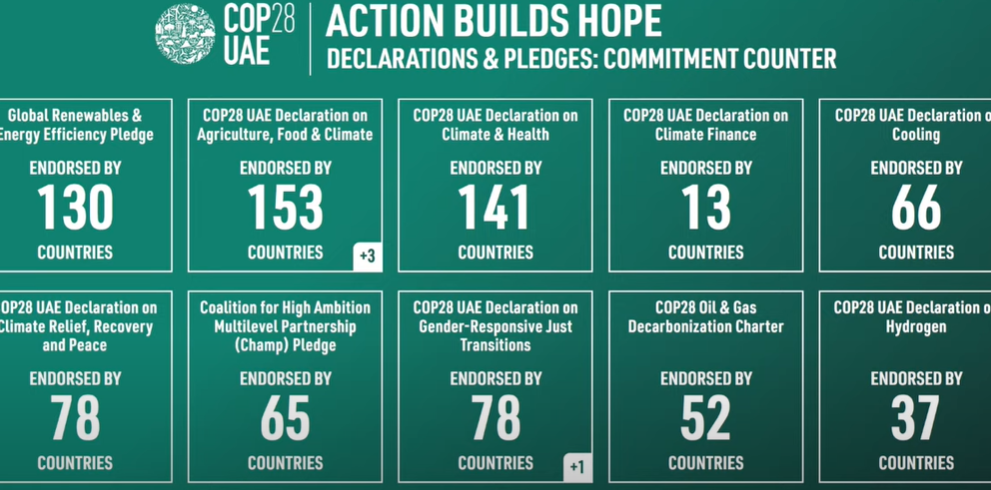COP28 Concludes: Global Consensus For Significant Climate Action Sets New Course

The two weeks of negotiations saw over USD 85 billion and 11 pledges and declarations committed to climate action
COP28, hosted in the United Arab Emirates, mobilised a significant number of voluntary pledges in the lead-up to its landmark final declaration calling for ‘transitioning away’ from fossil fuels.
After over two weeks of negotiations, the 28th Conference of Parties concluded on the 13th of December, with over USD 85 billion in financial commitment and 11 pledges and declarations to act against climate change.
Here are a few of the most significant developments:
Loss and Damage Fund
The Loss and Damage Fund was operationalised at COP28 to assist vulnerable nations in addressing the escalating costs and destructive effects of climate disasters. According to the COP28 Presidency, the fund received pledges totalling USD 792 million throughout the discussions.
In the meantime, the Green Climate Fund, which supports developing nations in their efforts to combat climate change, saw the biggest replenishment of USD 12.8 billion. The United States of America contributed USD 3 billion towards the Fund.
Tripling Renewables
By 2030, 130 nations pledged to triple the global capacity for renewable energy and double the annual rate of gains in energy efficiency. In a significant victory for those who supported it, the vow was included in the final agreement reached during the negotiations.
Transitioning Away from Fossil Fuels
During the negotiations, the US and the UAE were among the more than ten new members that the Powering Past Coal Alliance (PPCA) accepted. Currently, more than 80 per cent of OECD and EU nations are dedicated to the alliance. One of the biggest producers of fossil fuels, Colombia, joined the Fossil Fuel Non-Proliferation Treaty Initiative. The initiative is a campaign to stop new coal, oil, and gas development spearheaded by island nations vulnerable to climate change.
In the end, subnational governments and more than 100 cities united to demand the pact, but they were ultimately dismayed.
“Having the words ‘fossil fuels’ in the text is an important political signal, but it’s a far cry from the ‘historic’ outcome we were all calling for,” said the initiative’s Executive Director Alex Rafalowicz, in a statement on Tuesday at the COP28 summit.
Tripling Nuclear Energy
By 2050, more than 20 nations, led by the US, called for a tripling of nuclear energy capacity worldwide. Although nuclear power produces virtually no greenhouse emissions, the Fukushima nuclear disaster in Japan in 2011 caused a severe blow.
However, experts and activists point to the fact that new nuclear plants can take decades to come online while building renewable energy is significantly faster.
Food and Farming
A consensus was reached by nearly 160 nations to give food and agriculture a top priority in their national climate strategies. Observers praised the non-binding statement, given that food systems are thought to be accountable for almost one-third of greenhouse gases produced by humans. Some, however, critiqued it for missing specific objectives and failing to address fossil fuels or indicate a move towards more environment-friendly eating habits.
Healthy Future
141 countries signed a declaration to place health at the heart of climate action. It called for governments to step up action on climate-related health impacts like extreme heat, air pollution, and infectious diseases. Almost nine million people a year die from polluted air, while 189 million are exposed to extreme weather-related events.
Cooling Pledge
66 countries committed to cut the worldwide emissions of energy-hungry cooling devices, like air conditioners and refrigerators, by at least 68 per cent by the year 2050. For the additional 3.5 billion people who are affected by rising temperatures, the voluntary promise also attempts to develop more sustainable cooling methods.
UAE Climate Investment fund
The UAE said it was putting USD 30 billion into a new private climate investment fund. The fund, called ALTÉRRA, would partly try to focus on climate projects in the developing world and hoped to stimulate investments totalling USD 250 billion by 2030.
![]()



















































































































































































































































































































































































































































































































































































































































































































































































































































